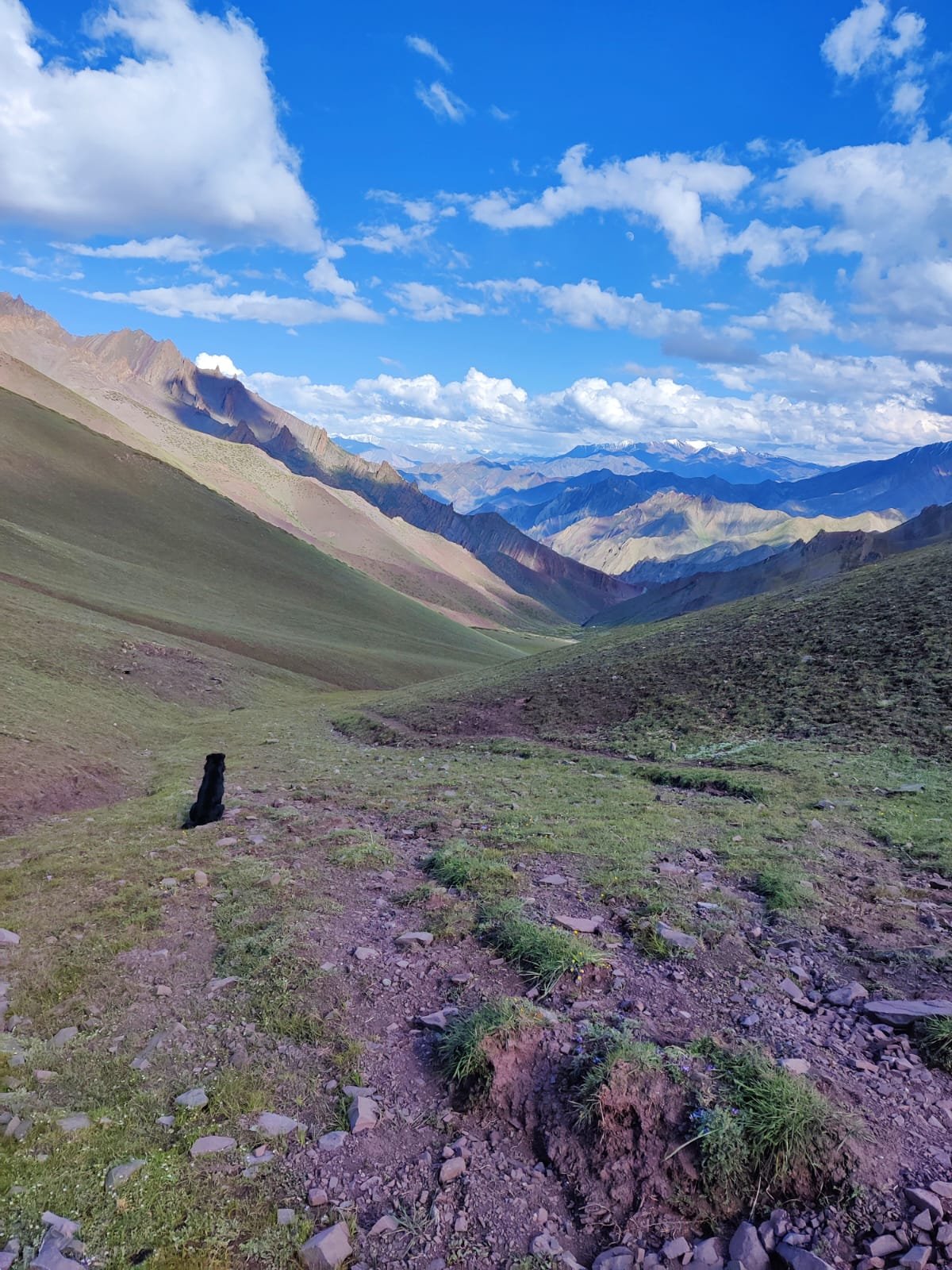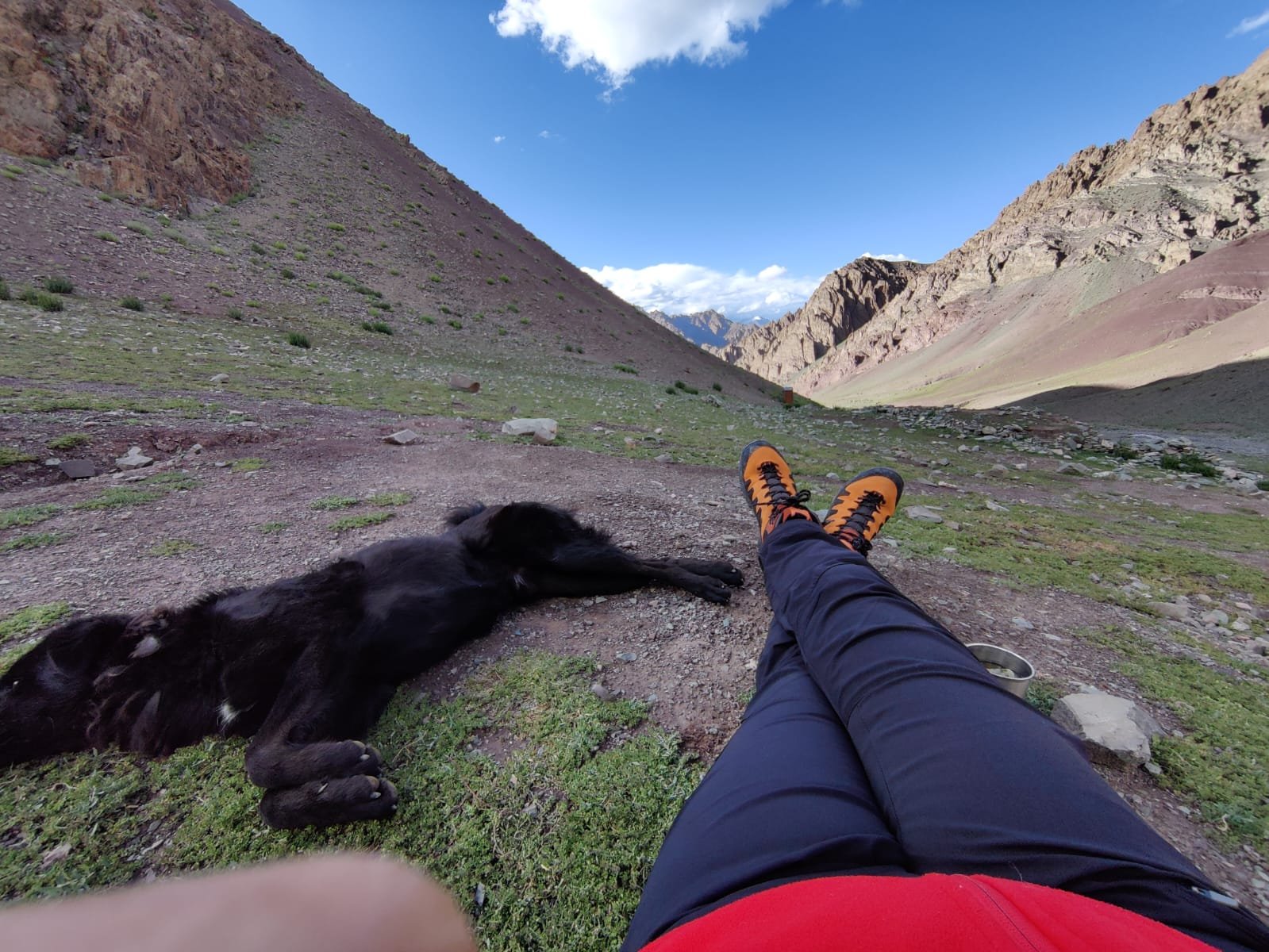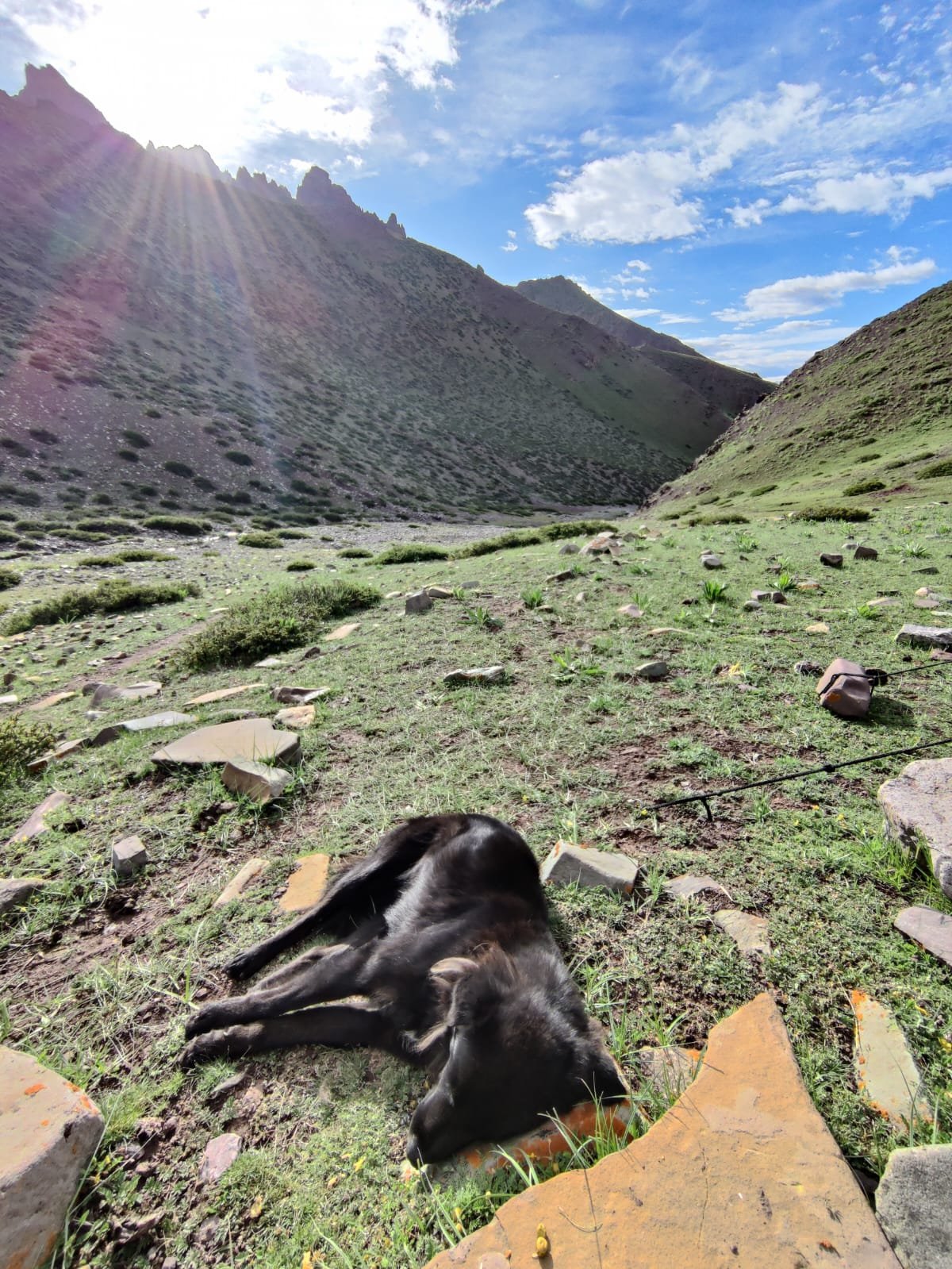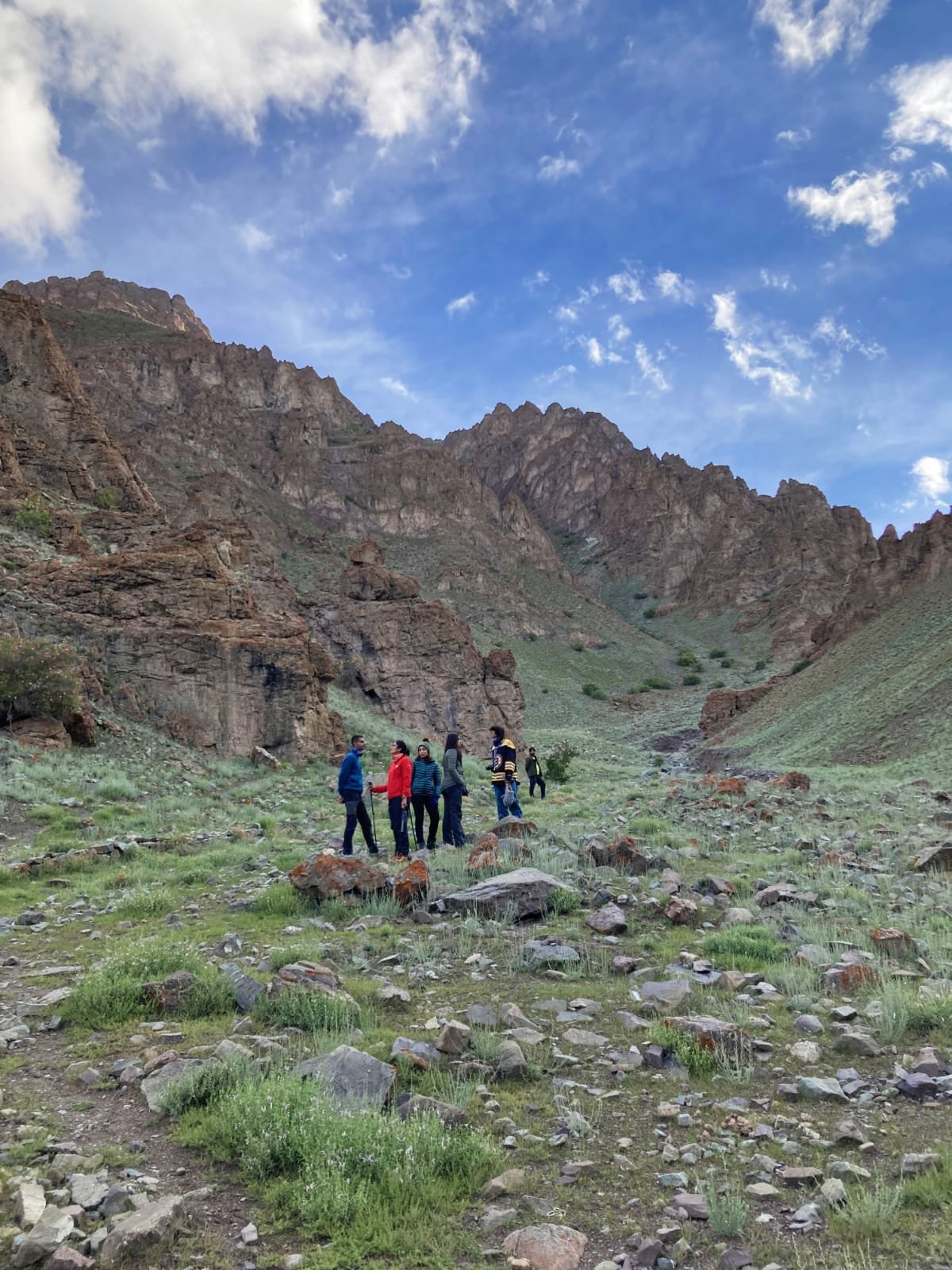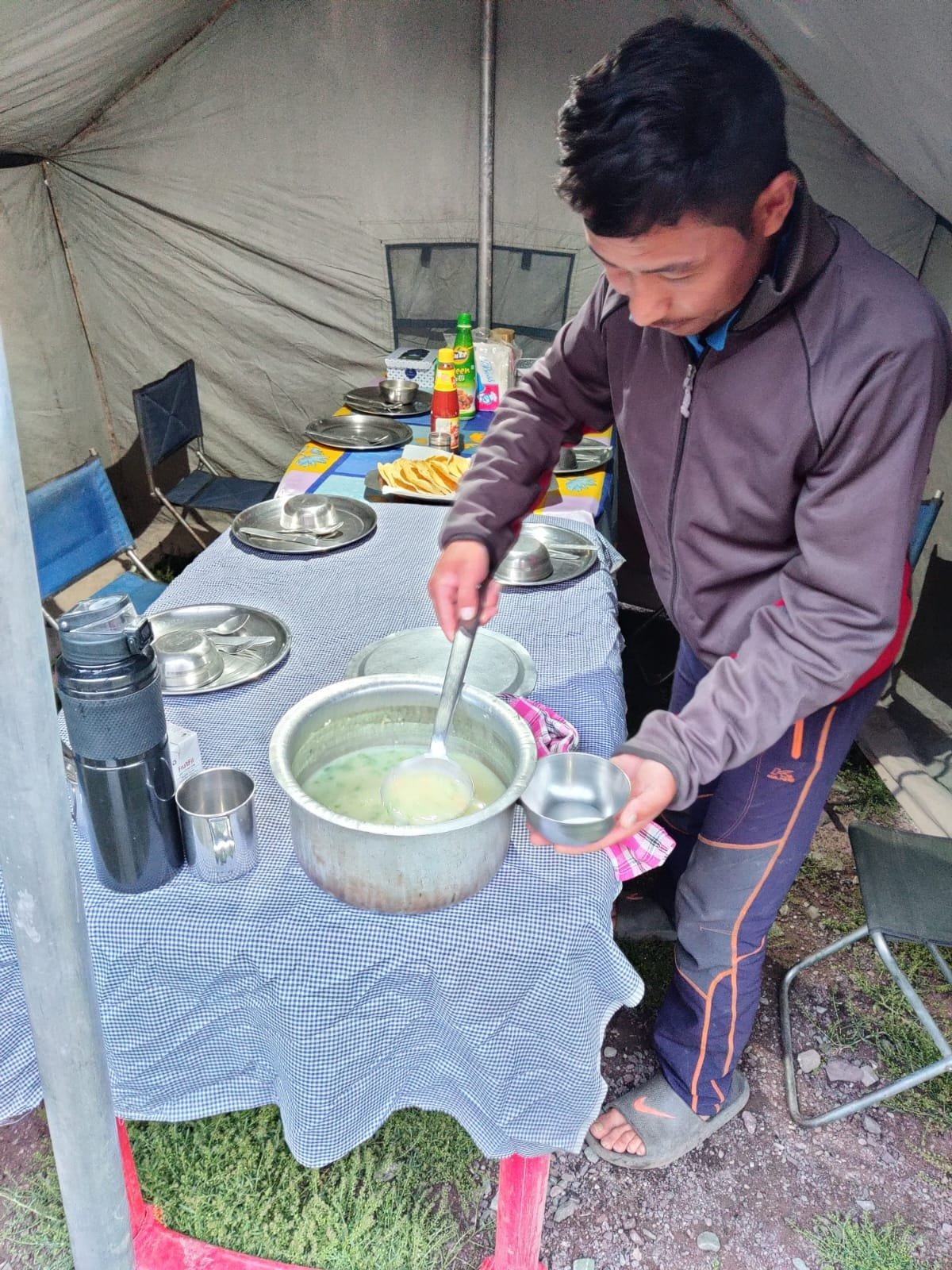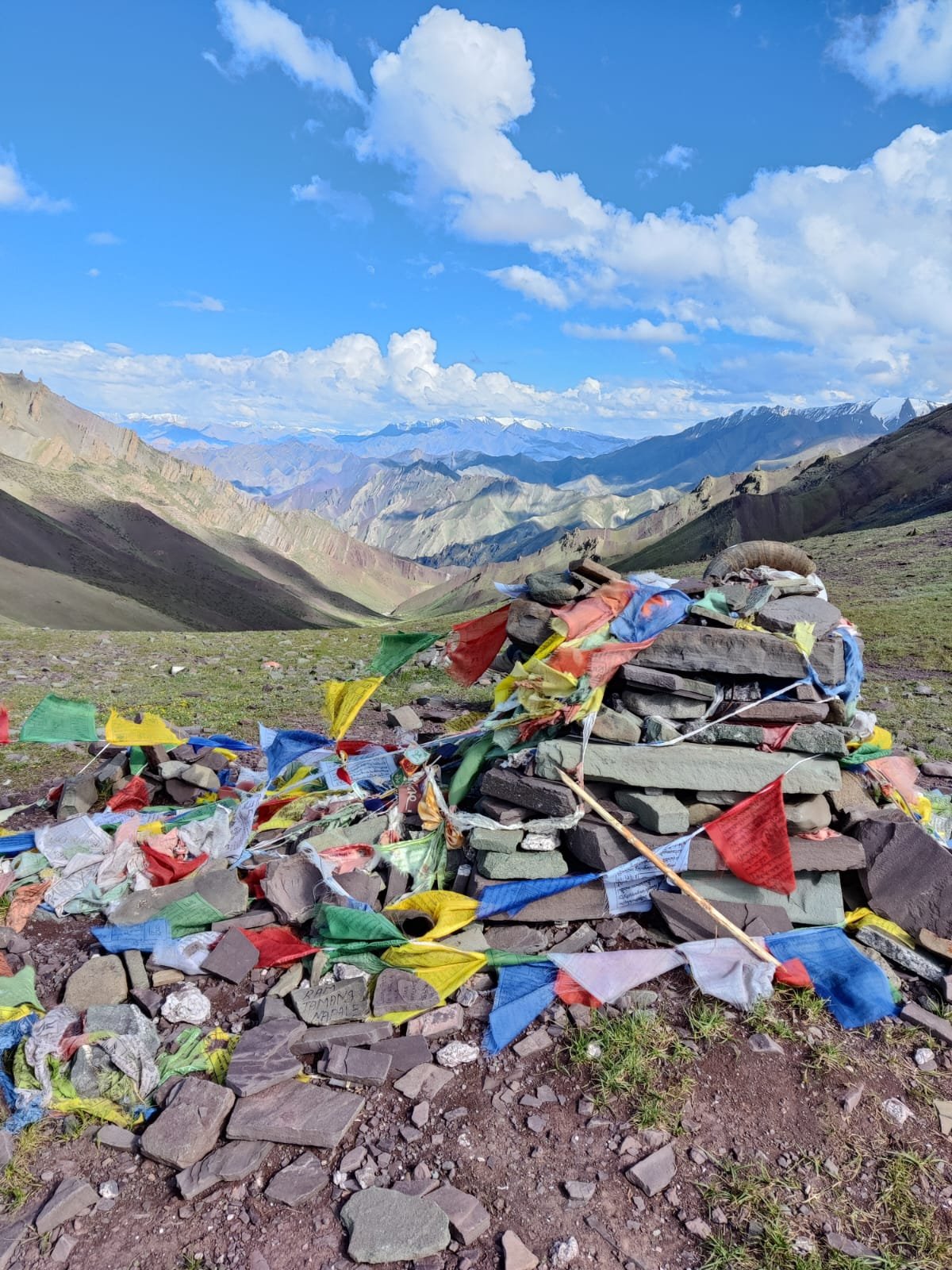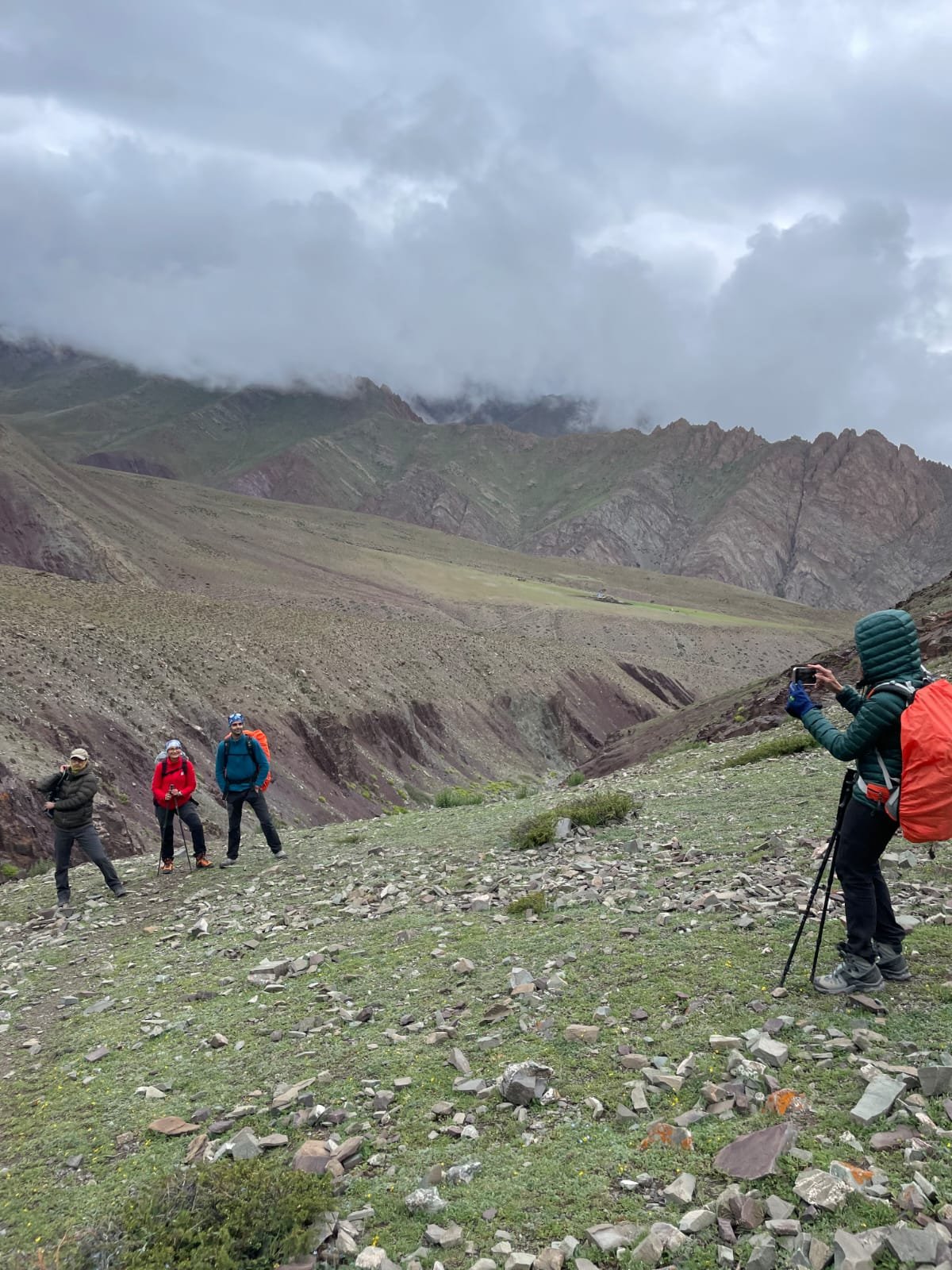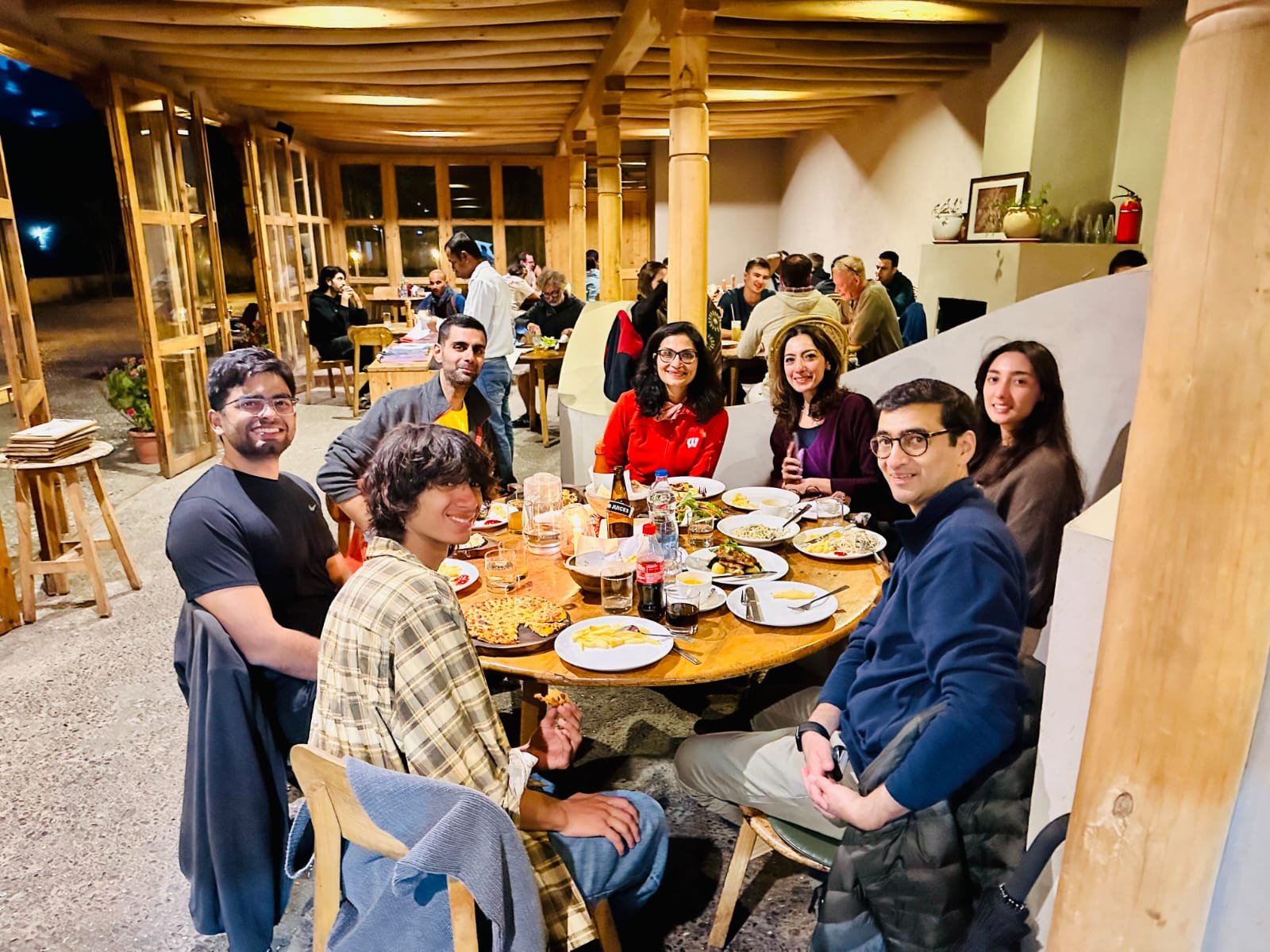Ah, the mountains of Ladakh. They cradle me as if I were resting my head in my mother’s lap.
It’s like a coming home to, when the mind is craving some clarity and the heart is aching for some solace, when you arrive at a crossroad in life and are figuring your way out.
There were questions that needed answers. And with just that intention—to seek—I decided to sign up for my first ever week-long trek in Ladakh, nudging me to step some more out of my comfort zone, and to add to my existing database of life lessons.
A view from Leh Palace
The initial few days of my time in Ladakh before the trek saw me working remotely with clients in therapy sessions, with acclimatizing walks and hikes interspersed in between. Being at an altitude of 11,500 feet and breathing rarefied air with less oxygen, I had to take care that I didn’t get acute mountain sickness.
Just being in Leh, the chatter in my mind quietened down, as I took in a panoramic view of the mountains all around me, and observed the people in town silently milling around, going through their day. Life was uncomplicated here, unlike what we city dwellers are encumbered with.
The original Markha Valley trek which I was supposed to embark on was literally washed away as the incessant, untimely rains cut off the access road to Skiyu, the starting point of the trek. The ground team of Boots & Crampons, the outfit that was leading our trek, sprung into action and it was decided we would traverse the pristine, less trampled trail of the Stok valley, through Matho La and Shang La, the two mountain passes, all the way to Shang Sumdo village. “It will be more challenging,” is what we were told. Of course, we’re in!
Moose, the protagonist of my story, at the start line :)
After a short bus ride from Leh town to Stok Valley, we started our trek on Day 1 from Stok to Chang ma. Soon a black dog came bounding by and stayed close to my heels while 2-3 other strays also joined in.
“How long they will walk with us?” I wondered. “Will they stick with us through the 5 days?” I asked Naresh. You will know too, as you read along.
Day 1 was supposed to be a short 2-3 hour walk but fairly soon into our trek, we encountered our first challenge: of crossing glacial melts that were streaming down as rivers, with rapid, swirling waters. My first ever river crossing on foot!
We took our hiking boots off, wore them around our neck, and saddled with our backpacks that had the day supplies we needed, started to cross the river. The water was icy cold and we had no idea where our feet would land because it was a rocky bed, hidden from plain sight, which made figuring out where to put the next step even more uncertain.
“Drag your feet, don’t lift them up,” yelled Chetan, our team leader from B&C, & Naresh, the skilled guide, over the sound of the loud, gushing water. Focused on not falling and getting swept away, I had no clue what they were saying. But with their strong support, all of us soon managed to cross the rivers, not once but thrice in one day, with my heart pounding loudly every time. Here came lesson # 1: Keep your faith bigger than your fear; and lesson # 2: Take one steady step at a time and before you know it, the worst would be over. Wait, there was lesson # 3: Always look ahead and keep marching on.
One step at a time
From afar, I saw a steep ascent on a hill coming up. It seemed daunting to say the least, but the river crossings earlier in the day gave me the confidence that nothing could be more challenging than this. Except when it is steep AND the 50% less oxygen in the air makes you winded really quickly. You begin to wonder just why you signed up for this. The lungs are screaming, the muscles are begging for oxygen to summit beyond the elevation, and the mind is going bonkers. Until you realize that it is just chatter and you unhook from it and carry on, reminding yourself that the views are always the best after the toughest climb. And so they were.
On reaching the top, there was a huge construction of cairns and a small temple that the locals had built to keep the valley protected. The prayer flags looked resplendent in the sun as they fluttered merrily, seemingly excited, bringing us some much-needed energy. We could see the gorgeous valley ahead, with the river flowing through it, inviting us to trek some more.
Lobzang, the quiet, attentive helper in the kitchen was waiting for us with tea, coffee, indulgent hot chocolate and some snacks as soon as he saw all of us trooping in from a distance. No phones, no radio sets, just a keen eye on the look out for the guests to arrive, and under the skilled chef Kunga, the kitchen staff ensured we were well fed. After short acclimatizing walks before dinner, and some more chit chat, we would wind up in our tents by 8:30 PM.
I was usually the first one to wake up around 5 AM every morning. Daylight would break around 4:45 AM and the kitchen tent would be buzzing with activity, with getting breakfast prepared and served by 7 AM, packing and winding up by 8 AM. Oftentimes lunch would also be cooked in the morning so that we could pause somewhere and eat a hot meal when the days were long on foot. The meals were a lavish, royal spread where every person’s dietary needs were met and there was such attention to detail, including what the kids in the group would like, which ended up being had by all the adults as well. Such was the meticulous planning of the Boots and Crampons team.
“Chalo ji. Ab ghar nayi jagah basaaye,” (Let’s move, and make our home at another location) said Naresh, our guide, as the staff packed tents and the kitchen up, and loaded the ponies with our luggage, and the camping paraphernalia. I was standing with him and reflected on how it actually was a home that we were dismantling and setting up elsewhere. A 5-bedroom home, with a dining room, an open-air living room, two toilets, and a kitchen. It was just what is needed to sustain and actually have a good time. What more do we really need? And yet, we end up cramming our homes, getting attached to material things, when we could live comfortably with less. Yet another lesson.
The scramble on all fours
Day 2 soon saw a climb on all fours literally, up a hill, on a mud trail with slippery rocks and pebbles, with such a steep gradient that I decided that I would be the last one to go up. I didn’t want to hold the others behind me. I struggled initially and wanted guidance to navigate the path without falling. But everyone was out of ear shot from me.
When you are alone, and you know you have nobody to fall back on, you decide to summon up your own courage and get down to doing what you have set your mind to. I heard Chetan shout out, “Just follow the foot tracks,” but I couldn’t even see them marked clearly. And so I tried my best, walked partly on uncharted territory, and reached the top because I had set my mind to it.
The eight of us sat in a line and gazed at the mountains in silence, interspersed with smatterings of conversations. We were all awe-struck to say the least.
The group of us
I chose to mostly stay at the end of the pack. I was in no rush to reach the end-of-the-day campsite and wanted to take in the 360 degree view of the mountains in addition to being with my own thoughts, and the calm that also flowed in between. I had some reflections on life that were begging some attention and I needed to square them away. Being by myself, in this amazing landscape with no other human (other than my small group of trekkers), and with sounds of nature such as the whistling winds, the pitter patter of the rain on my jacket, the gushing rivers, or an occasional call of the marmot or a lone bird, I was sure the mind would be put to ease.
Reflections.
Not everyone is comfortable with silences and with looking deep within. You just never know what comes up, and it gets overbearing, and you want to run and hide. I like braving the storm and was keen on coming back with answers at journey’s end. I have found the best insights in the lap of nature, surrounded by silence, and in gazing at the star-studded sky at night.
Day 3 saw us climbing a mountain pass at an altitude of 4965 metres (16,300 feet). Objects in the distance seem closer than they actually are, is what I concluded from when I saw Matho La from the camp site and when we actually reached the pass at the end.
When you set your sight on a goal, you persist, scramble, crawl, struggle even, till you get there. Isn’t life similar? You just never know what keeps coming up, how long the road ahead is, what obstacles come in the way, but you keep walking, you keep your eyes on your goal, and you finally feel triumphant at having accomplished it, against all odds. You emerge stronger, more resilient, more seasoned, after having weathered many a storm.
On top of Shang La (16,200 feet)
Such was the experience as we climbed two mountain passes in two days. The mind was interestingly quiet because even if it was screaming “I want to quit this treacherous trek,” uhhh, where would you go? There was no easy exit so it just naturally ploughed along towards the finish. Which goes to show how much we fall victims to the tantrums of the mind. If we can learn to see it merely as chatter that is coming by to just wreak some havoc, and instead focus on what we are striving for—our goal, we will be in such a happier, more content space. I speak from experience :)
I developed a method when traversing the mountains so that I could manage it with ease, without tiring myself, and with the singular focus of having a good time: A fixed number of steps and then a pause for 15 breaths when there is an altitude gain was my mantra. I got to appreciate the vastness of the valley around me, the blue skies, the soaring eagle, the distant yaks, and sheep grazing, and a celebration of how far I had come. And just like that, with this pathway chalked out in front of me, and a belief in my abilities, I reached the mountain passes.
As the reflections and the introspections continued, the revelation emerged that what I had just experienced in the mountains, in the midst of the challenges that life was throwing at me lately, was the power of hope, a topic that I have researched on in the aftermath of a spinal cord injury or an illness. Hope is a cognitive construct that involves three things: A goal, a sense of personal agency or a belief in yourself that you can achieve that goal, and the pathways you chart out to get there. When you see hope as a silver lining, the clouds of despair and self-doubt make way for a better tomorrow. Clarity was beginning to sink in on how I needed to navigate life to bounce back stronger. Hope is such an energizer.
Enough about me…
Moose and King
How can I come this far into my blog and not write about Moose, who stole my heart from the minute I cast my eyes on him at the start point? He started with us and I asked Naresh how far would he go, remember? “Sometimes they finish the entire trek,” he said. And so, Moose, and King, a salt and pepper companion to Moose, set off with us.
The first time our hearts were in our mouths was when we crossed that first gushing rapid and Moose was trying to figure out how he could find his way to us. He paused, looked around, paused some more, and jumped across, only to have his front paws barely grasping the edge of the other side of the riverbed. Stuck amidst a heavy thicket of bushes, he finally clambered on amidst shouts of “Yay” and applause from all of us. We stayed together through thick and thin from then on. He silently waited to be given food served to him on flat boulders wherever we could find them, and whatever we ate, was shared with Moose and King.
They would either be the leaders of the group or one of them would be behind, making sure the last person was in. They paused where we paused, often waiting patiently for all of us to assemble at the predetermined meeting point. Moose and King were not the kinds who would huddle with the humans. They had a sense of detachment, but in their quiet ways they looked out for us. Or we felt that they had our backs. That was enough.
They would sit outside our tents, guarding us as was evident with their lone barks in the dead of the night. One particularly rainy night I tried to get Moose inside the tent but he refused to enter, choosing instead to continue his self-appointed guard duties. I became the food provider, feeding them every meal, and taking care of them in my own way, and I knew I was soon heading for a heartbreak. But I am not the one to ever stop in my tracks for fear of that. When you love, you love fiercely, and that’s all I have known. The love story continued.
My puppy :)
“He's such a puppy,” we all would exclaim. Till one day, on our acclimatization walk, we saw him run surefootedly up two mountains, in an excited pursuit of some blue sheep. This was within a few minutes, where all of us were frozen in our tracks, seeing our Moose transform into Eliud Kipchoge, except going vertically. We sighted a snow leopard from afar, which is why the sheep were running for their life, only to realize that Moose was coming the other way to chase them some more. Our Moose was a hunter after all, but for me, he was still a puppy.
What being let in feels like
Moose was initially a bit jumpy, fearful of being too close, lest someone hits him. But soon enough, as trust was built, he would allow me to pet him, wipe him down when he got wet in the rain, or to just snuggle him in a warm embrace. Contact comfort was healing me for sure, while Moose was always his Zen self. King had taken his own independent path on Day 3, where we saw him vanish into the direction of Matho village. He was King, after all, the Master of his own destiny.
The nights were getting colder as we gained a steady ascent, and we sipped on a steaming mug of hot chocolate on reaching the campsite. There was a camaraderie and an ease as strangers became friends who were on their own individual journey to seek something on this trek: adventure, pushing limits, fun, solitude, companionship, answers to life, dealing with an existential crisis, basking in silence, nature, tapping into their potential, rekindling relationships, forming new friendships, digital detox, or whatever else it could be.
The river crossings came and went, with ease this time, the ascents and descents were tackled with love and patience, pain was taken along as a companion and also a testimony of the arduous journey we had undertaken, life was lived well without being connected with the rest of the world, and without the doom scrolling of social media, work emails, messages or whatever else we felt was indispensable earlier, and was important to numb ourselves with. Nature in all its glory had taken over, and caused a shift within, luring us to explore more, to climb more, to take on another new challenge, to dig deep within, and in the end asking us if we wanted more, were we thirsty for more.
While I had found answers to what I was seeking on the trek, I knew the one lesson that I needed to learn was on heartbreak and detachment. And it expectedly came in the form of a tearful goodbye to Moose when we reached the end point of our trek.
Till we meet again, Moose
I hugged him and thanked him for being with us on this remarkable journey, for taking care of us, for braving the elements of nature for us, for giving us so much joy and comfort. I was reassured by the leader of the group of ponies that Moose would end up walking with them to Choglamsar where he would find his way to Stok village.
“I hope he doesn’t follow us.”
“I hope he isn’t distressed at our departure.”
I kept hearing myself say this. I hoped he would maintain his detached stance that he had displayed so magnificently throughout the trek.
I was wrong.
I was the first to sit in the bus. I couldn’t bear to look behind and see what would unfold when the bus started moving but I was prepared for whatever would happen.
Moose came sprinting behind as the bus started moving. I couldn’t look because I was shedding silent tears. I am unabashed in expressing my emotions that way. The bus slowed down to maneuver a big crater in the road and Moose thought that we were stopping for him, and he paused in his tracks, only to see us disappear from his sight. There were words of anguish spoken, and some of us wept in silence at the sense of abandonment we were all feeling so acutely. So deep was the love between a gentle animal we had met a few days ago and us, who only communicated with his eyes, who loved us too as evidenced by his trust in us, letting us into his world.
How could I deal with this love, heartbreak, and detachment? By wishing him well. By finding solace in the fact that he would be able to take care of himself, like he had done all along. By reminding myself that even if I took him with me to the city, I would be robbing him off his freedom to be a part of these mountains, his true home. By expressing gratitude for all that he brought to us. By reminding myself that not all love needs to be taken into possession. You love with your heart, even from a distance, and then you part ways. By tucking away in a corner of our heart, of all that he taught us by showing us a mirror. Of having us face our own vulnerabilities, by turning our weaknesses to strengths.
Isn’t everything transient and temporary? Aren’t we just fellow travelers who cross paths, enrich lives in that moment, and walk our own way? Aren’t we all going to face the loss of someone we love(d)? Answers to these questions made my heart stronger.
I thought of Moose every day for the rest of my trip, hoping he was OK. Hope kept me going, not anxiety or worry, not the “what if” questions, not to question the “why” we had to part ways. It was inevitable, it is the way of life.
It wasn’t just reaching the top of the mountain passes that was exhilarating. It wasn’t about conquering the mountains and feeling like we had accomplished something that brought the adrenaline high. It was every bit of the high and low, every bit of the climb and the crossing, every revelation, every insight, every moment of pain and fatigue and still walking ahead; every bit of that heartache in the end, the friendships and the separations, of love and longing, of moving forward despite the trials, of celebrating life in all its glory.
Ladakh, my love story with you, will continue.
PS: Thank you so much for being the most fabulous team to be with: Chetan, Naresh, Shalini, Rajat, Amaan, Aanya, & Etaash :) Picture credits go to the entire team.













